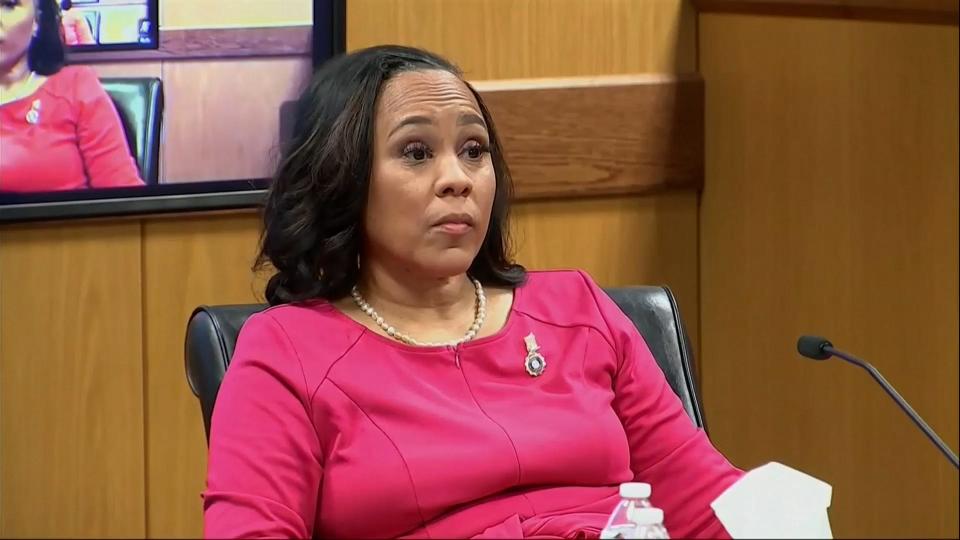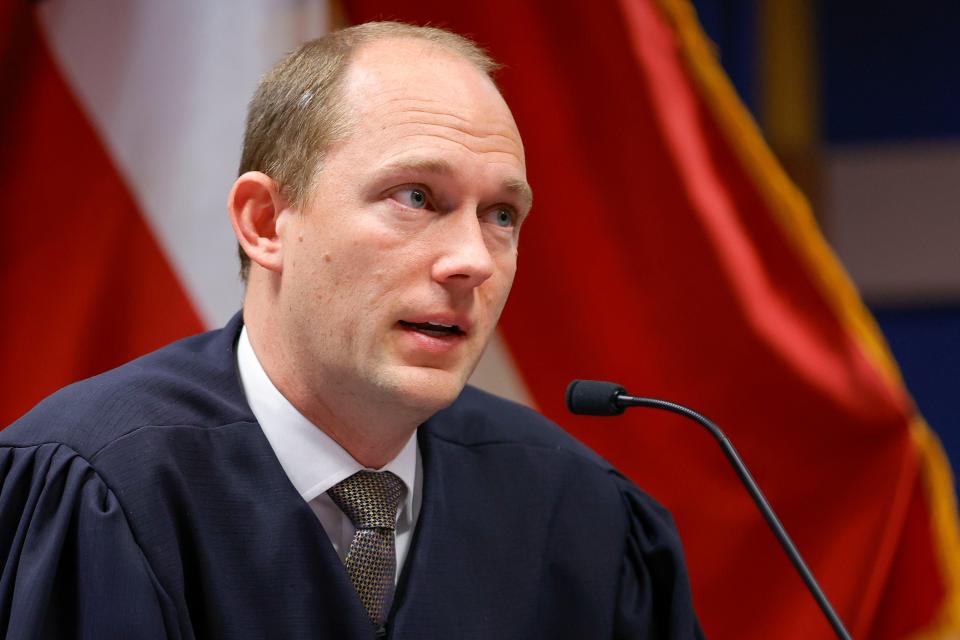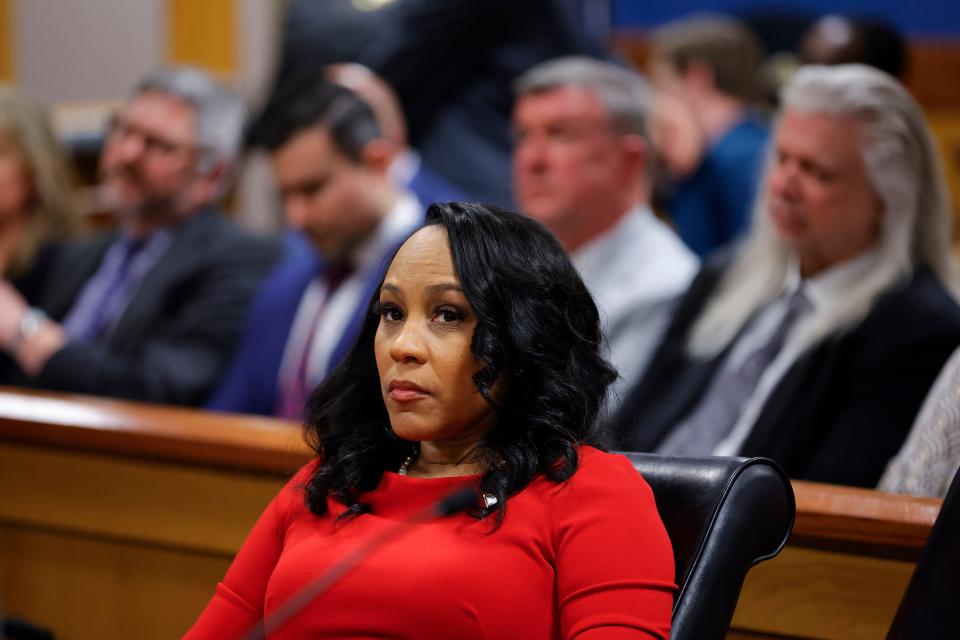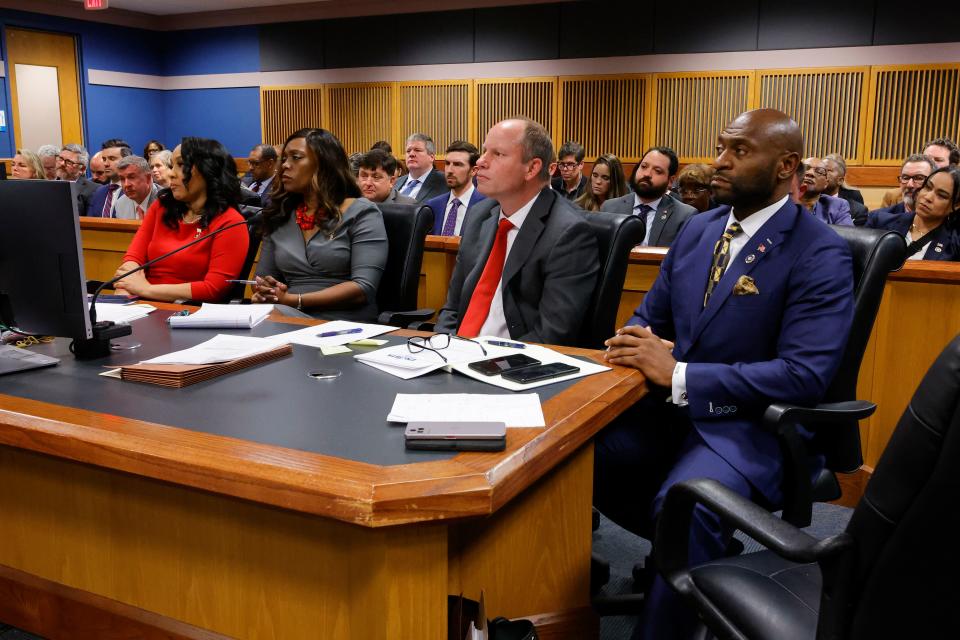Fani Willis can stay on Georgia Trump election case, judge rules. Special prosecutor resigns
A Georgia judge on Friday sharply criticized Fulton County District Attorney Fani Willis and said she must fire the special prosecutor she hired to oversee the sweeping election fraud case against former President Donald Trump or see her office lose control of the case.
Atlanta-based Superior Court Judge Scott McAfee, in a much-awaited ruling, said Willis had created the "significant appearance of impropriety that infects the current structure of the prosecution team" by having a romantic relationship with special prosecutor Nathan Wade, who is supervising the case against Trump and 14 others for allegedly trying to overturn the results of the 2020 election in the state.
Within hours, Wade hand-delivered his resignation letter to Willis and she accepted it, "effective immediately."
In his resignation letter, obtained by USA TODAY, Wade notes that McAfee ruled that the defendants seeking his and Willis' disqualification had "failed to meet their burden" of proving an actual conflict of interest in the case. But, he wrote, "I am offering my resignation in the interest of democracy, in dedication to the American public, and to move this case forward as quickly as possible."
A stark rebuke for Fani Willis
McAfee’s ruling was a stark rebuke for Willis, who defiantly insisted she had done no wrong in dramatic court testimony last month and in a sworn affidavit and could significantly impact the course of Trump’s legal and political future.
If Willis had refused to remove Wade, McAfee said, he would refer the case to the Prosecuting Attorneys’ Council of Georgia for reassignment ? an option that would almost certainly delay the trial well past the Nov. 5 presidential election. No trial date has been set.
The Georgia prosecution is one of two criminal cases against Trump that focus on his efforts to overturn the results of the 2020 election he lost to Biden. Firing Wade, the judge said, will allow “the District Attorney, the Defendants, and the public to move forward without his presence or remuneration distracting from and potentially compromising the merits of this case.”
Neither Willis nor Wade had immediate comment except for Wade's letter of resignation and a letter in response by Willis. Trump's lead defense counsel, Steve Sadow said he was not satisfied with the judge's ruling.

"While respecting the Court’s decision, we believe that the Court did not afford appropriate significance to the prosecutorial misconduct of Willis and Wade, including the financial benefits," Sadow said in a statement to USA TODAY. "We will use all legal options available as we continue to fight to end this case, which should never have been brought in the first place.”
Ashleigh Merchant, the lawyer who first filed the disqualification motion on behalf of Trump associate and co-defendant Michael Roman, also said McAfee's ruling did not go far enough. But, she added, "While we believe the court should have disqualified Willis’ office entirely, this opinion is a vindication that everything put forth by the defense was true, accurate and relevant to the issues surrounding our clients right to a fair trial."
A third co-defendant, former Trump campaign lawyer and New York Mayor Rudy Giuliani, said through a spokesman that the decision revealed clear evidence of prosecutorial misconduct.
"It defies logic for Fani Willis or Nathan Wade to remain on this case, considering the clear evidence of prosecutorial misconduct, including evidence of financial gain and providing untruthful testimony,” said Ted Goodman, a Giuliani spokesperson.
Judge Scott McAfee notes 'an odor of mendacity' in Willis' testimony
The Republican-appointed judge had hinted at the possibility of ruling this way last month by asking questions about whether he might only need to find that Willis had created the appearance of a conflict of interest in her relationship with Wade. Attorneys for Trump and other defendants seeking to disqualify Willis' office had argued for using that standard, while also arguing Willis improperly benefited financially from hiring Wade through vacations they took together.
Prosecutors argued that defense attorneys had to prove an actual conflict of interest ? and Willis and Wade both testified that she repaid him in cash for her part of the travel. In his 23-page ruling, McAfee said Willis needed to be held to a higher standard.
McAfee said Friday that Willis and Wade had severely damaged their credibility while on the witness stand."However, an odor of mendacity remains," he wrote, adding that there were "reasonable questions" over whether they had "testified untruthfully about the timing of their relationship."

More: Fani Willis hearing: a salacious drama that could undermine Trump election interference case
Months of intense legal wrangling
McAfee’s ruling caps more than two months of intense legal wrangling that began with a Jan. 8 court filing by a former Trump 2020 campaign official who accused Willis of engaging in a “clandestine” and improper romantic relationship with Wade, a private attorney with virtually no experience prosecuting complex cases like the sweeping election racketeering one he now heads.
Willis responded that she hired him more as a trusted manager of the overall investigation and trial than as a prosecutor.

Roman, a Trump 2020 campaign official, said the relationship violated state conflict-of-interest laws and had so irrevocably tainted the case that Willis and the DA's office needed to be disqualified ? and the case dismissed entirely.
Roman, through defense lawyer Ashleigh Merchant, alleged in the court filing that Wade used some of the more than $650,000 in Fulton County money he had been paid on the case for their travel, in what amounted to an illegal form of self-dealing.
Trump and several other co-defendants soon joined Roman in the motion to disqualify, and in attempting to dig up more information about their relationship, including cellphone records that might show when they were together.

That prompted McAfee, who was appointed to the Superior Court bench in February 2023 by Republican Gov. Brian Kemp, to schedule two days of evidentiary hearings last month ? and then a third ? to hear from all parties.
Both days of testimony and cross-examination were marked by combative exchanges.
The defense lawyers accused Willis and Wade of lying about key details of their relationship, including when it began and who paid for the trips to places such as Aruba and California wine country.
On the witness stand and in sworn affidavits, Willis and Wade denied the accusations. At one point, Willis entered the courtroom and said she wanted to testify even as prosecutors in her office were fighting to quash a subpoena forcing her to do so.
More: Read the ruling: Georgia judge decides on Fani Willis disqualification in Trump RICO case
"You think I’m on trial," Willis said from the stand on Feb. 15. "These people are on trial for trying to steal an election in 2020,” she added, gesturing to the defense table. “I’m not on trial no matter how hard you try to put me on trial."
The ‘Find Me the Votes’ case
In the Fulton County case, a grand jury indicted Trump, some top White House and campaign officials and even Georgia state officials on charges that they illegally conspired by various means to overturn the election results in Georgia. Part of that effort was Trump’s now-infamous call to Georgia Secretary of State Brad Raffensperger to “find” him enough votes – more than 11,000 – to flip the battleground state from Biden to him.
Trump has acknowledged asking Raffensperger about the votes and other elements of the Georgia case against him. But he said they were part of a legitimate – and legal – effort to document evidence of widespread voter fraud that could reverse the election results. Exhaustive government probes and court proceedings have found no evidence to support Trump’s claims.

Roman, for his part, is charged with trying to work with other Trump campaign officials to persuade state legislators in Georgia and other battleground states to illegally appoint their own slate of fake presidential electors to replace the ones that legitimately voted for Biden based on the vote in that state.
Willis has other prosecutors who could take over the case, including some within her office and at least one, John Floyd, who she also hired as a special prosecutor. Floyd is a renowned expert in the complex racketeering law that Willis is using against Trump and the others.
What’s next for the case for Willis and Trump?
If Willis fires Wade to protect her ownership of the case, she faces the daunting task of navigating the complex legal terrain surrounding Trump’s alleged election interference while also dealing with accusations of impropriety. She is likely to face a flurry of motions aimed at questioning her leadership of the case as it proceeds to trial, as well as a variety of other legal challenges by the defendants.
In addition to Trump, Roman and Giuliani, defendants include former White House Chief of Staff Mark Meadow and former Georgia state senator and former state Republican Chairman David Shafer. All have pleaded not guilty.
Four others have pleaded guilty and are cooperating in the case, including former Trump campaign lawyer Jenna Ellis and legal adviser Sidney Powell.
This article originally appeared on USA TODAY: Fani Willis news: Judge says DA can stay on. Prosecutor Nathan Wade resigns
